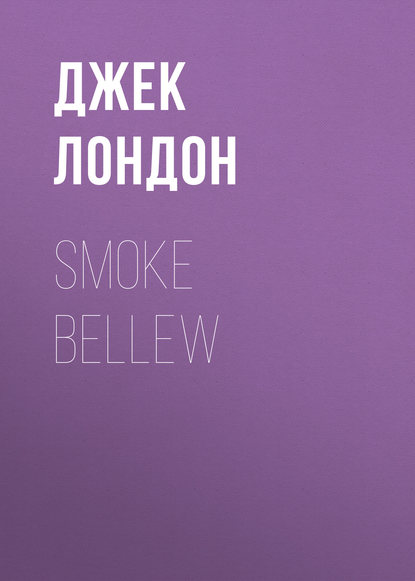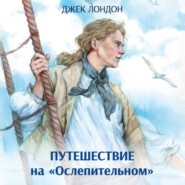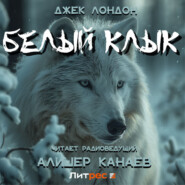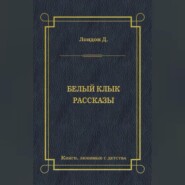По всем вопросам обращайтесь на: info@litportal.ru
(©) 2003-2024.
✖
Smoke Bellew
Настройки чтения
Размер шрифта
Высота строк
Поля
Smoke made no reply. He was battling with a sudden rush of thought.
“Hey! You! Here comes the string. Tell me when you’ve got it.”
A small pocket-knife, weighted on the end of the string, slid down the ice. Smoke got it, opened the larger blade by a quick effort of his teeth and one hand, and made sure that the blade was sharp. Then he tied the sheath-knife to the end of the string.
“Haul away!” he called.
With strained eyes he saw the upward progress of the knife. But he saw more – a little man, afraid and indomitable, who shivered and chattered, whose head swam with giddiness, and who mastered his qualms and distresses and played a hero’s part. Not since his meeting with Shorty had Smoke so quickly liked a man. Here was a proper meat-eater, eager with friendliness, generous to destruction, with a grit that shaking fear could not shake. Then, too, he considered the situation cold-bloodedly. There was no chance for two. Steadily, they were sliding into the heart of the glacier, and it was his greater weight that was dragging the little man down. The little man could stick like a fly. Alone, he could save himself.
“Bully for us!” came the voice from above, down and across the bulge of ice. “Now we’ll get out of here in two shakes.”
The awful struggle for good cheer and hope in Carson’s voice decided Smoke.
“Listen to me,” he said steadily, vainly striving to shake the vision of Joy Gastell’s face from his brain. “I sent that knife up for you to get out with. Get that? I’m going to chop loose with the jack-knife. It’s one or both of us. Get that?”
“Two or nothing,” came the grim but shaky response. “If you’ll hold on a minute – ”
“I’ve held on for too long now. I’m not married. I have no adorable thin woman nor kids nor apple-trees waiting for me. Get me? Now, you hike up and out of that!”
“Wait! For God’s sake, wait!” Carson screamed down. “You can’t do that! Give me a chance to get you out. Be calm, old horse. We’ll make the turn. You’ll see. I’m going to dig holds that’ll lift a house and barn.”
Smoke made no reply. Slowly and gently, fascinated by the sight, he cut with the knife until one of the three strands popped and parted.
“What are you doing?” Carson cried desperately. “If you cut, I’ll never forgive you – never. I tell you it’s two or nothing. We’re going to get out. Wait! For God’s sake!”
And Smoke, staring at the parted strand, five inches before his eyes, knew fear in all its weakness. He did not want to die; he recoiled from the shimmering abyss beneath him, and his panic brain urged all the preposterous optimism of delay. It was fear that prompted him to compromise.
“All right,” he called up. “I’ll wait. Do your best. But I tell you, Carson, if we both start slipping again I’m going to cut.”
“Huh! Forget it. When we start, old horse, we start up. I’m a porous plaster. I could stick here if it was twice as steep. I’m getting a sizable hole for one heel already. Now, you hush, and let me work.”
The slow minutes passed. Smoke centered his soul on the dull hurt of a hang-nail on one of his fingers. He should have clipped it away that morning – it was hurting then – he decided; and he resolved, once clear of the crevasse, that it should immediately be clipped. Then, with short focus, he stared at the hang-nail and the finger with a new comprehension. In a minute, or a few minutes at best, that hang-nail, that finger, cunningly jointed and efficient, might be part of a mangled carcass at the bottom of the crevasse. Conscious of his fear, he hated himself. Bear-eaters were made of sterner stuff. In the anger of self-revolt he all but hacked at the rope with his knife. But fear made him draw back the hand and to stick himself again, trembling and sweating, to the slippery slope. To the fact that he was soaking wet by contact with the thawing ice he tried to attribute the cause of his shivering; but he knew, in the heart of him, that it was untrue.
A gasp and a groan and an abrupt slackening of the rope, warned him. He began to slip. The movement was very slow. The rope tightened loyally, but he continued to slip. Carson could not hold him, and was slipping with him. The digging toe of his farther-extended foot encountered vacancy, and he knew that it was over the straight-away fall. And he knew, too, that in another moment his falling body would jerk Carson’s after it.
Blindly, desperately, all the vitality and life-love of him beaten down in a flashing instant by a shuddering perception of right and wrong, he brought the knife-edge across the rope, saw the strands part, felt himself slide more rapidly, and then fall.
What happened then, he did not know. He was not unconscious, but it happened too quickly, and it was unexpected. Instead of falling to his death, his feet almost immediately struck in water, and he sat violently down in water that splashed coolingly on his face. His first impression was that the crevasse was shallower than he had imagined and that he had safely fetched bottom. But of this he was quickly disabused. The opposite wall was a dozen feet away. He lay in a basin formed in an out-jut of the ice-wall by melting water that dribbled and trickled over the bulge above and fell sheer down a distance of a dozen feet. This had hollowed out the basin. Where he sat the water was two feet deep, and it was flush with the rim. He peered over the rim and looked down the narrow chasm hundreds of feet to the torrent that foamed along the bottom.
“Oh, why did you?” he heard a wail from above.
“Listen,” he called up. “I’m perfectly safe, sitting in a pool of water up to my neck. And here’s both our packs. I’m going to sit on them. There’s room for a half-dozen here. If you slip, stick close and you’ll land. In the meantime you hike up and get out. Go to the cabin. Somebody’s there. I saw the smoke. Get a rope, or anything that will make rope, and come back and fish for me.”
“Honest!” came Carson’s incredulous voice.
“Cross my heart and hope to die. Now, get a hustle on, or I’ll catch my death of cold.”
Smoke kept himself warm by kicking a channel through the rim with the heel of his shoe. By the time he had drained off the last of the water, a faint call from Carson announced that he had reached the top.
After that Smoke occupied himself with drying his clothes. The late afternoon sun beat warmly in upon him, and he wrung out his garments and spread them about him. His match-case was water-proof, and he manipulated and dried sufficient tobacco and rice-paper to make cigarettes.
Two hours later, perched naked on the two packs and smoking, he heard a voice above that he could not fail to identify.
“Oh, Smoke! Smoke!”
“Hello, Joy Gastell!” he called back. “Where’d you drop from?”
“Are you hurt?”
“Not even any skin off!”
“Father’s paying the rope down now. Do you see it?”
“Yes, and I’ve got it,” he answered. “Now, wait a couple of minutes, please.”
“What’s the matter?” came her anxious query, after several minutes. “Oh, I know, you’re hurt.”
“No, I’m not. I’m dressing.”
“Dressing?”
“Yes. I’ve been in swimming. Now! Ready? Hoist away!”
He sent up the two packs on the first trip, was consequently rebuked by Joy Gastell, and on the second trip came up himself.
Joy Gastell looked at him with glowing eyes, while her father and Carson were busy coiling the rope. “How could you cut loose in that splendid way?” she cried. “It was – it was glorious, that’s all.”
Smoke waved the compliment away with a deprecatory hand.
“I know all about it,” she persisted. “Carson told me. You sacrificed yourself to save him.”
“Nothing of the sort,” Smoke lied. “I could see that swimming-pool right under me all the time.”
VIII. THE HANGING OF CULTUS GEORGE
The way led steeply up through deep, powdery snow that was unmarred by sled-track or moccasin impression. Smoke, in the lead, pressed the fragile crystals down under his fat, short snow-shoes. The task required lungs and muscle, and he flung himself into it with all his strength. Behind, on the surface he packed, strained the string of six dogs, the steam-jets of their breathing attesting their labor and the lowness of the temperature. Between the wheel-dog and the sled toiled Shorty, his weight divided between the guiding gee-pole and the haul, for he was pulling with the dogs. Every half-hour he and Smoke exchanged places, for the snow-shoe work was even more arduous than that of the gee-pole.
The whole outfit was fresh and strong. It was merely hard work being efficiently done – the breaking of a midwinter trail across a divide. On this severe stretch, ten miles a day they called a decent stint. They kept in condition, but each night crawled well tired into their sleeping-furs. This was their sixth day out from the lively camp of Mucluc on the Yukon. In two days, with the loaded sled, they had covered the fifty miles of packed trail up Moose Creek. Then had come the struggle with the four feet of untouched snow that was really not snow, but frost-crystals, so lacking in cohesion that when kicked it flew with the thin hissing of granulated sugar. In three days they had wallowed thirty miles up Minnow Creek and across the series of low divides that separate the several creeks flowing south into Siwash River; and now they were breasting the big divide, past the Bald Buttes, where the way would lead them down Porcupine Creek to the middle reaches of Milk River. Higher up Milk River, it was fairly rumored, were deposits of copper. And this was their goal – a hill of pure copper, half a mile to the right and up the first creek after Milk River issued from a deep gorge to flow across a heavily timbered stretch of bottom. They would know it when they saw it. One-Eyed McCarthy had described it with sharp definiteness. It was impossible to miss it – unless McCarthy had lied.
Smoke was in the lead, and the small scattered spruce-trees were becoming scarcer and smaller, when he saw one, dead and bone-dry, that stood in their path. There was no need for speech. His glance to Shorty was acknowledged by a stentorian “Whoa!” The dogs stood in the traces till they saw Shorty begin to undo the sled-lashings and Smoke attack the dead spruce with an ax; whereupon the animals dropped in the snow and curled into balls, the bush of each tail curved to cover four padded feet and an ice-rimmed muzzle.
The men worked with the quickness of long practice. Gold-pan, coffee-pot, and cooking-pail were soon thawing the heaped frost-crystals into water. Smoke extracted a stick of beans from the sled. Already cooked, with a generous admixture of cubes of fat pork and bacon, the beans had been frozen into this portable immediacy. He chopped off chunks with an ax, as if it were so much firewood, and put them into the frying-pan to thaw. Solidly frozen sourdough biscuits were likewise placed to thaw. In twenty minutes from the time they halted, the meal was ready to eat.
“About forty below,” Shorty mumbled through a mouthful of beans. “Say – I hope it don’t get colder – or warmer, neither. It’s just right for trail breaking.”
Smoke did not answer. His own mouth full of beans, his jaws working, he had chanced to glance at the lead-dog, lying half a dozen feet away. That gray and frosty wolf was gazing at him with the infinite wistfulness and yearning that glimmers and hazes so often in the eyes of Northland dogs. Smoke knew it well, but never got over the unfathomable wonder of it. As if to shake off the hypnotism, he set down his plate and coffee-cup, went to the sled, and began opening the dried-fish sack.
“Hey!” Shorty expostulated. “What ‘r’ you doin’?”

















